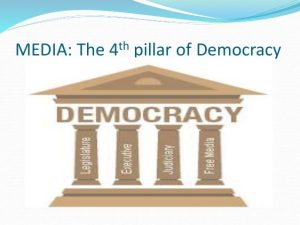The media is often acknowledged as the Fourth Estate of the Realm, which follows as a matter of importance after the three arms of government in modern societies.
In recognition of the place of the media in the social, economic, and political development of society, Nigeria, like other democracies, provided the media with constitutional backing for optimum functionality. Not only did the 1999 Nigerian Constitution guarantee the freedom of expression and to own, establish and operate any media for the dissemination of information, ideas, and opinions, but it also charged the media with the responsibility to monitor governance and hold the government accountable to the people.
Without a doubt, democracy thrives alongside a strong media which promote pluralism and deliberation, particularly in a heterogeneous country like Nigeria. Through vibrant media, citizens from different backgrounds, with different interests and expectations can discuss and form consensus for running the state, sharing benefits, and protection of basic rights, among others. Hence, a free and critical media is considered the bedrock of any modern democracy.

Today, the media through its watchdog function is highly essential to safeguarding transparency of democratic processes by providing access to information; accountability and legitimacy of individuals, institutions and processes; and for rightful participation and public debate. This media role is particularly imperative in Nigeria today amidst pervasive corruption and impunity to equip the electorates with necessary and comprehensive information to make informed choices and to hold public officials and institutions accountable to the people.
As a means for the prevention and investigation of allegations of violations or malpractice, the watchdog role of the media can ultimately engender good governance. Thus, as a watchdog of the Nigerian society, the media owe it as a constitutional mandate to monitor governance closely, and to ensure the rule of law and accountability on the part of public office holders.
In this sense, the media is significant to the achievement and sustenance of social, economic, and political development. The import of this is that a vibrant media is an essential contributor to the framework for the attainment of social and political development goals, alleviation of poverty, security of life and property, as well as peace and prosperity. In extension of its role of promoting good governance, the media has the responsibility of mediating between the government and the governed.
However, the media can only play these important roles when it is conscientious, strong and independent enough to appropriately and adequately monitor, investigate and criticise the policies and actions of the government. The significance of a vibrant media was evident in post civil war Nigeria, particularly during the years of struggle against military juntas despite violent crackdown.
Today, after more than two decades of democratically elected government, the Nigerian media landscape is far freer but far less vibrant, distracted, and fast becoming a sleeping lap-dog to say the least. To live up to expectation, corruption and irresponsibility must be stamped out in the Nigerian media industry, as a corrupt and irresponsible media cannot hold a corrupt and irresponsible government accountable to the people. More importantly, to help promote democracy and not to destroy it, the Nigerian media must deliberately avoid creating chaos, fears and crises by avoiding hate speeches and fake news.